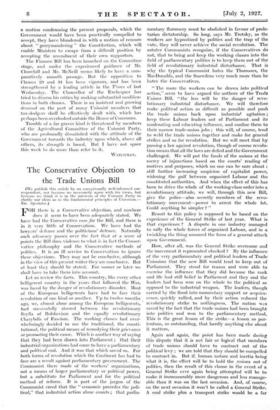The Week in Parliament 910WARDS the end of last week
a murmur arose amongst certain Unionist members of Parliament concerning the proposals of Lords Cave, Birkenhead, and Salisbury for the reform of the House of Lords. These proposals, it will be remembered, had been thrown out in the course of debate in the Upper House without warning, and without any kind of previous consultation or discussion with members of the Unionist Party in the House of Commons.
During the weekend the murmur spread and increased in strength. By Monday it had assumed the character of an uproar, and it became clear that the opinion of rank and file members of Parliament had been seriously misjudged by those who were pressing the proposals for reform upon the Cabinet. It is hardly surprising that a mistake of this kind should have been made, because the loyalty which the Government have consistently received from the Unionist Party as a whole has been sufficiently comprehensive and unswerving to inspire them with considerable confidence in making legislative proposals. There are, however, some things that the advanced and very democratic wing of the party—which is of more substantial proportions than is generally supposed will not stand. This, apparently, was one of them.
02 Tuesday a meeting of the Central Council of the National Union of Conservative Associations was held, at which Lord Selborne and Sir John Marriott learnt from Sir Arthur Shirley Benn, Colonel Spender Clay, Mr. Duff Cooper, and Mr. Blundell that the opposition to their ideas about the House of Lords was likely to be determined and substantial. The protagonists of the Government scheme were at first inclined to smile at the efforts of their opponents. It was only another " Y.M.C.A." alarmist stunt. But, as the hours slipped by, scepticism gave way to astonishment, astonishment deepened into alarm. And when at midnight on Tuesday a motion to the effect that " no amendment of the constitution or powers of the House of Lords is practicable unless and until some form of general agreement is achieved " was tabled, signed by some seventy Unionist members, the doom of the proposals was finally sealed. The events of Monday and Tuesday give cause for-genuine satisfaction. In the first place the House of Commons decisively reasserted its authority, and its rights as the final arbiter in matters of legislation of what is and what is not to be. In the second place they signalized a triumph for Tory Democracy after a considerable experience of the shadows. I have never seen opinion mobilized and a subsequent " revolt " organized with such speed and efficiency, or with such devastating, effect. The Labour Party have, as usual, botched what might have been, from their point of view, a promising Parliamentary situation. Instead of quietly tabling a motion condemning the present proposals, which the Government would have been practically compelled to accept, they have blundered in with a motion of censure about " gerrymandering " the Constitution, which will enable Ministers to escape from a difficult position by accepting the amendment of their own supporters.
The Finance Bill has been launched on the Committee stage, and under the experienced guidance of Mr. Churchill and Mr. McNeill seems likely to have a com- paratively smooth passage. But the opposition to Clauses 29 and 31 has been vigorous, and has been strengthened by a leading article in the Times of last Wednesday. The Chancellor of the Exchequer has tried to disarm his critics by making substantial modifica- tions in both clauses. There is an insistent and growing demand on the part of many Unionist members that tax-dodgers shall be effectively dealt with, which has perhaps been overlooked outside the House of Commons.
Trouble of a far graver kind is threatened by members of the Agricultural Committee of the Unionist Party, who are profoundly dissatisfied with the attitude of the Government towards the industry upon which, above all others, its strength is based. But I have not space this week to do more than refer to it.
WATCHMAN.















































 Previous page
Previous page